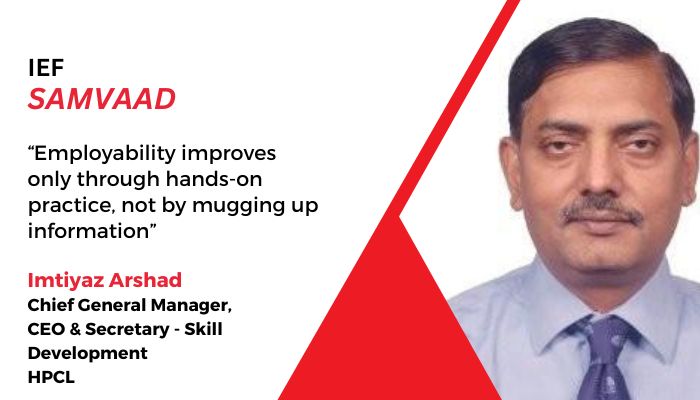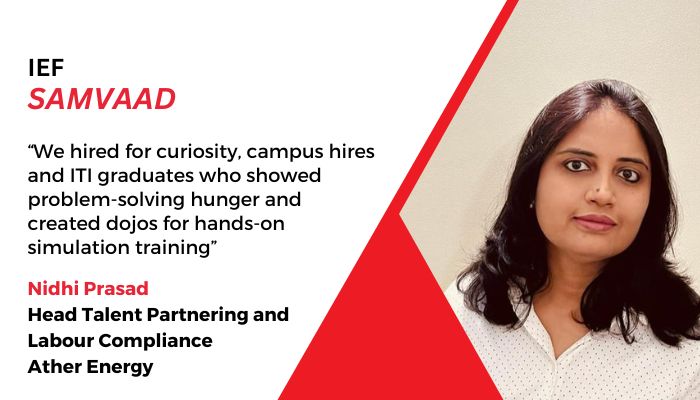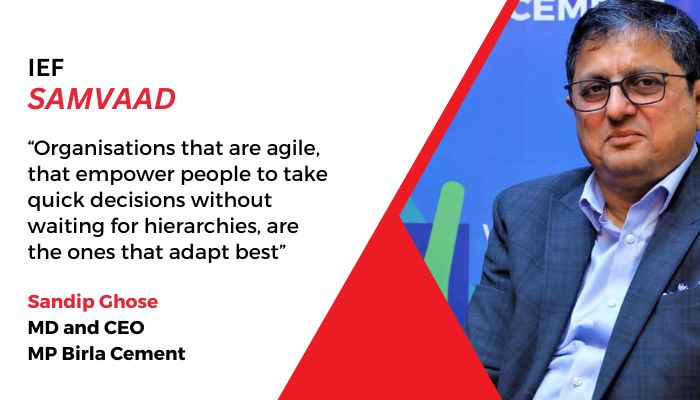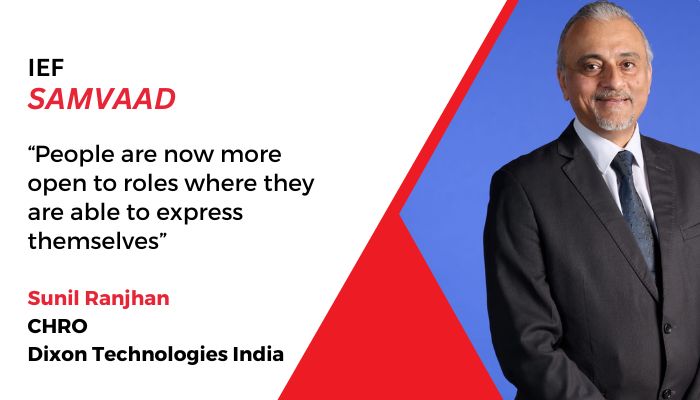Sanjay Vakharia, Co-founder & CEO, Spykar in a conversation with India Employer Forum on the great Covid learnings that will stay relevant in the post pandemic world of work.
Q. Tell us a little about yourself and your three decade journey with Spykar.
I’m Sanjay Vakharia, CEO and Co-founder of the brand Spykar. This is the third decade of our existence as a brand. Mr Prasad Pabrekar and I founded this brand in 1992. It’s really challenging to put all these 30 years into a couple of lines, but we started off as a pure play denim manufacturer and sellers. Our idea was always to bring to the markets the kind of products that we wanted for ourselves. Personally, I have always been wanting to be part of the passion/marketing/brand. From my earliest days of education, I’ve tried to build some level of competencies around marketing and sales with a clear focus on brand. Even in my 11th standard, I looked at marketing and salesmanship as an elective in my college purely because brands lured me a lot and got me excited all my life. I’m very happy that what started as a very simple interest in advertising has led me to get into a space, where I’ve been able to build a very very successful and a brand which one can be proud of.
Q. What is the most critical investment you think companies should make today for their businesses to have an effective long-term impact?
For the most primary investments anyone has to really make is actually arrive at a focus area and a vision which you want to fulfil over a particular period of time, and subsequent to that, and the most natural follower to that is one has to build a very very competent and a very exciting and an enthusiastic team around it because both these things feed into each other and they render the other person or the other thing incompetent and ineffective if any one of them is not very clear. So, I think what you really desire for yourself and then to have a team which really goes all out and tries to get to the desired objective, it becomes very very critical for any business in today’s times to function and to succeed.
Q. What are the top three learnings about people, processes, and technology in the pandemic, which will stay relevant in the post-pandemic world of work?
I think the pandemic taught all of us to adapt to change. As people, we were forced to confine ourselves to some small places, to long hours of talking to each other over a screen, confining ourselves to making life do without much, living with less, adapting to changes around us, especially the tech changes which are happening around us. This made us clearly see that there is a very huge potential that each of us have and if we are forced to deliver on those, we will not fall short. So, there has to be enough motivation or coercion or force for people to really take on things. There is a lot of hidden and latent potential in each of us which does not come to the fore, unless it’s very critical. So, that’s one learning that I have. I think from a process perspective, the pandemic situation told us that while processes are so important, to put things in the right perspective and build efficiencies, they really should not be the obstacles and to let itself be a little nimble on that front as well. So, you don’t need to really cast your processes in stone, where they become stumbling blocks rather than building blocks. So, from that perspective, there has to be certain areas within the entire process, which if needed, can be not tweaked, but improvised to take care of situations which arise, which we have not been accustomed to or were ready for. So, the process is very important, because it brings a lot of semblance of standardization. It builds a lot of predictability in the entire business, but it has to have that bit of flexibility for it to be useful to you in those dire circumstances. Also there is so much technology all around us. It’s very important that we identify the technology which will help us to grow and which is necessary for us to grow, because we have to figure out What’s important from the rest around us, and I think there’s so much that’s being sold and thrown around us across every piece of basically everything that we can ever think of is now put across to our parallel to you in the form of technology.
Q. There are many factors that drive a company’s culture. What do you think should be the focus points while gauging and building the culture of a company? Are there any important aspects that you think are frequently overlooked?
Culture is a habit, or something more than just a habit. We need to first define what culture is and then it becomes very different from what it should be for many different businesses, many industries and also based on the longevity of the business. So, a lot of things will change for businesses like Spykar which are 30 years old, and in these 30 years, so much has happened around us and the business has been built purely on the back of an excellent team, which the company and the brand possesses. Along with the team, also comes a lot of longevity and a bit of complacency. The new set of people that Spykar is getting onboard are coming with a very fresh perspective of the brand and its culture. It becomes all the more challenging, but an interesting challenge to have, where you ensure that the best of both worlds are brought in and you ensure that the worst of both worlds don’t come together. Because culturally, the mix is very stark, and hence, you have to be all the more careful that the loyalty, the commitment and the comfort that the old people bring on table and the experience that they get is very well blended with the enthusiasm, the aspiration and the ambition that the new set of people come with. When they come and join a company like Spykar at the senior level, that’s probably the only area that one really needs to work on.
Q. Reports forecast that India will have more than 250 unicorns by 2025. What are your recommendations to startups out there and what can they learn from your hindsight?
One of the biggest reasons why we have so many successful unicorns is that they probably are moving in the area which they are not aware of and they go in with a lot of faith and trust and a lot of aspiration, but without the baggage of any experience. So, a lot of times this baggage of experience and your knowledge actually wears you down. So, my advice to anybody over there is to follow your gut because nine times out of 10 best businesses are built on the gut, but follow it up with very good and sincere execution. If there’s a mix of these two, and obviously, every money that you spend, consider it as your own money that you’re spending, which will bring in a lot of frugality and the bottom line in focus, which is so critical for any business to succeed. Though, sometimes ignorance is bliss, in the case of startups, it is surely a blessing. So, I would recommend each and every person out there who wants to expand himself into doing something of his own, start very young, and for a startup, you need to keep daring and follow your own gut, and I’m sure success will follow.
Watch the full interview: In Conversation with Sanjay Vakharia, Co-founder & CEO, Spykar
About Sanjay Vakharia
Sanjay Vakharia is the CEO of Spykar Lifestyle Private Ltd. and has been part of the original team who founded Spykar in 1992. Prior to joining Spykar, he worked with Magna Publications as the Export Manager (Garments) wherein he was responsible for setting up the marketing network in the US and UK markets. Additionally, he served as Marketing Manager for the Toys and Games division of the Magna group. In 1990, he set up the Jeanswear Brand RAGZ, in partnership with a few friends.
His sharp business acumen saw him rise from overseeing product development and Marketing to being the CEO. He has played a key role in the overall Marketing and Brand Communication strategies at Spykar. Under the astute direction of Vakharia, Spykar has set up a robust distribution platform across the length and breadth of the country spanning EBO’s, LFR’s, MBO’s, and online sales. Besides online, Spykar has over 2000 points of Sales across 350 towns and cities of the country. It is his passion and purpose to be unique that makes Spykar deliver a product that is easily distinguishable from the rest of the brands in the denim market. His keen eye on every aspect of business coupled with extensive travel across the world has led to inputs which have propelled Spykar to compete with the leading international brands. Spykar has the distinction of serving one of the most fickle consumers of the country, the youth, for over two decades and this has resulted in Vakharia being one of the few professionals in the industry having a wealth of knowledge on this consumer segment.





